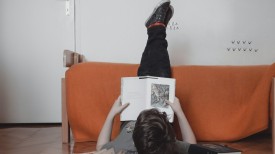5 Books That Will Ignite Your Mind and Awaken Your Senses
In a world filled with distractions, it is sometimes hard to notice the quiet beauty surrounding us constantly. Being aware of our senses is like being open to the wealth of life, such as the aroma of a flower and the sound of a busy street. Through the power of literature, we can be guided on mindfulness, where extraordinary moments can be found in ordinary things.
In the five following books, characters often search for answers to the challenges of being present in a hurried society. Through their experiences, we discover how using our senses can transform the dullest of meetings into rich memories. From the texture of a leaf being touched gently to the taste of a palatable meal, these books prompt us to enjoy the world and appreciate the pleasure of existing in the moment.
The Mezzanine by Nicholson Baker
Nicholson Baker's debut novel, originally published in 1986 and now reissued, ingeniously reimagines mundane objects and routines through a one-story escalator ride. From milk cartons to shoe-tying, Baker defamiliarizes the ordinary, infusing it with poetic charm and sharp storytelling.
Through unconventional, conversational prose, he elevates the seemingly trivial into a celebration of everyday life. While appearing to be about nothing at first, the book reveals the profound beauty in reflection and the significance of simple human experiences, offering a witty and inventive exploration of the world around us.
Gazelle by Rikki Ducornet
The book unfolds Elizabeth's coming-of-age tale in 1950s Cairo, where her mother's pursuit of lovers contrasts with her father's immersion in chess and toy soldiers. Elizabeth's adolescent awakening intertwines with her fascination with her mother's allure and her father's friend, Ramses Ragab, a perfume maker who introduces her to hieroglyphics and exotic scents.
The scenery of Elizabeth's dream is the same as that in the explicit edition of "The Arabian Nights," which reflects her rising needs and curiosity. The book unites the themes of enchantment, connectedness, and romance in a sense-defying plot.
READ ALSO: Drew Carey Unveils the Self-Help Book Shaping His Daily Routine
Two Trees Make a Forest by Jessica J. Lee
The book explores memory, love, and landscape in Taiwan, blending nature writing and memoir. Jessica J. Lee's journey, sparked by letters from her immigrant grandfather, delves into the island's forests and flatlands.
She uncovers the interconnectedness of human and natural histories, encountering unique flora and fauna while reflecting on colonialist legacies. Lee's prose, praised by Robert Macfarlane, evokes the beauty and complexity of Taiwan's terrain, from mountain hikes to encounters with endangered species.
This melding of family relationships with a completely different type of narrative not only exposes the subtle interrelations between geographical forces and individual stories but also serves as an analogy for reflecting on identity, belonging, and the deep influence of language.
The Book Of Salt by Monique Truong
Monique Truong's book delves into the story of Binh, a Vietnamese cook who worked for Gertrude Stein and Alice B. Toklas in 1930s Paris. He balances domestic life's chaos while contemplating his place in the world. Sitting in his kitchen, Binh sees how complicated the lives of his employers and their friends are. His thoughts wander to colonial Saigon and his meetings in Paris with figures such as Paul Robeson and Ho Chi Minh.
Truong's narrative delves into themes of yearning, betrayal, and identity against the backdrop of Parisian artistry and exile.
Still Life with Oysters and Lemon by Mark Doty
Mark Doty's writing, praised for its blend of toughness and serenity, delves into the emotional significance we attach to everyday objects in the book. Through lyrical prose, Doty explores the profound connections we form with ordinary things, illuminating how we imbue them with personal meaning.
This exploration invites readers to contemplate the deeper layers of attachment and significance that underlie our interactions with the material world.
RELATED ARTICLE: 6 Books Written By Women to Nurture Happiness and Wellness
© 2023 Books & Review All rights reserved.
Popular Now
1
Books to Read After 'Fourth Wing': Top Picks for Fantasy and Romantasy Fans

2
‘The Secret Public’ by Jon Savage Book Review: An Insightful Look Into the LGBTQ Influence

3
Stephanie Regalado's 'If They Only Knew' Column Is Now A Book, Unleashing 60 Anonymous True Stories to Empower Women

4
'No Wire Hangers' Scene That Almost Did Not Happen: New Book Reveals Faye Dunaway's Struggles

5
Rare First Edition of Aphra Behn's Novel 'Oroonoko' Discovered in Kent: A Historic Literary Find

Latest Stories
Book Reviews
‘The Secret Public’ by Jon Savage Book Review: An Insightful Look Into the LGBTQ Influence

Book News
Stephanie Regalado's 'If They Only Knew' Column Is Now A Book, Unleashing 60 Anonymous True Stories to Empower Women

Book News
'No Wire Hangers' Scene That Almost Did Not Happen: New Book Reveals Faye Dunaway's Struggles

Book Reviews
‘The Perfect Couple’ by Elin Hilderbrand Book Review: A Captivating Summer Mystery

Book News
New Book ‘The Franchise’ Reveals Penguins President Kyle Dubas’ ‘Biggest Mistake’ as Maple Leafs GM











